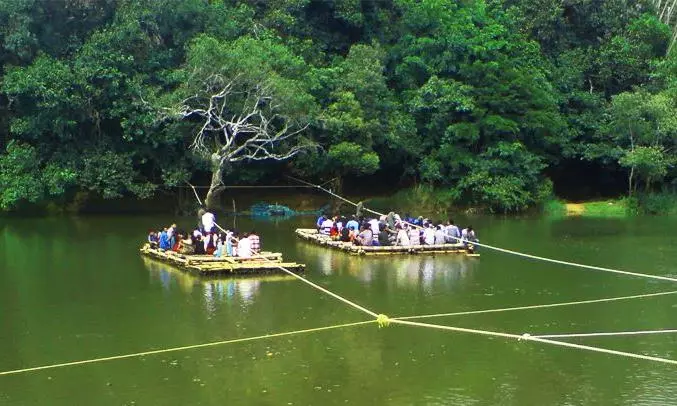
Wayanad animal attacks: Closure of eco-tourism hits local economy hard
Rising call for government intervention to expedite re-opening of eco-tourism centres while ensuring safety of animals, visitors and locals

Since February 17, 2024, all tourist destinations in Kerala's Wayanad district have been shut down following the tragic deaths of two individuals caused by a wild elephant named Belur . Aneesh, a tractor driver, and Mathew, a forest watcher employed by the Kuruva eco-tourism project, were trampled to death in two separate incidents in February.
Prompted by recent wild animal attacks, the Kerala High Court expressed serious concerns about the escalating human-animal conflict resulting in the loss of lives, mandating the temporary closure of eco-tourism centres in Wayanad district. Environment activists, too, urged the government to close down these tourism centres until the monsoon.
Wildlife vs tourism
N Badhusha, president of the Wayanad Prakriti Samrakshana Samiti (Environment Protection Committee), said the rapid expansion of homestays and resorts along the edges of forests has resulted in an increase in human-wildlife conflicts.
Elephants photographed in the Wayand jungle area in Kerala. Image: iStock
According to reports, many resort owners are conducting illegal trekking and wildlife safaris at night, often with the assistance of forest officials. Therefore, it is suggested that facilities, particularly those situated in elephant corridors and forest areas, be closed to mitigate these conflicts, said Badhusha.
Since the incidents occurred, several prominent eco-tourism sites have ceased operations. These include Soochippara Water Falls, Chembra, Peak Trekking Trail, Kuruva Islands and Meenmutty Waterfalls, all situated within the South Wayanad Forest Division.
Additionally, closures have affected Muthanga Jungle Safari and Tholppetti Eco-Tourism Centre, both located within the Wayanad Wildlife Sanctuary, as well as Brahmagiri Trail, Muneeswarankunnu Trekking Trail and Meenmutti Waterfalls at Korome, which fall under the North Wayanad Forest Division. This has dealt a severe blow to the local populace heavily reliant on tourism for their livelihoods.
Plunging business
For the past three months, Venugopalan, 62, hasn't had any passengers for his tourist taxi jeep on Kuruva Island. Usually, he conducts jungle safaris for visitors to Tholpetty and Kuruva using his specially painted forest safari jeep.
“Since the closures, we auto-taxi and jeep operators, who rely on tourism, have been struggling. There are over 40 jeeps in Tholpetty forest area catering to tourists. Because our jeeps are painted green for forest safaris, we can't easily switch to regular taxi services. So, people aren't calling us for rides like they used to,” said Venugopalan.
“Before the closure, I used to earn around Rs 50,000 per month from jeep rides and a small homestay during peak tourist seasons. However, over the past three months, my income has plummeted to just Rs 5,000 after covering expenses. Now, I'm facing difficulty meeting loan payments and vehicle insurance costs. I worked in the Middle East for years and used those savings to buy the jeep. I have a family to support, including a daughter studying nursing in Karnataka,” he added.
The Wayanad District Tourist Guides Association underscores the urgency of restoring normalcy to revive the region’s economic lifeline. Members stress the need to resume operations swiftly as tourism is the primary source of income for many locals.
However, they acknowledge the importance of implementing robust safety protocols to mitigate the risks posed by wild animals. Not only does this closure impact immediate stakeholders but it has wider ramifications for the entire economy of the district.
Blow after blow
“In Kuruva Island alone, there are over 40 shops, including hotels and small fancy shops. Many of us have taken loans from institutions like (Kerala government scheme) Kudumbasree and other financial entities. Over the last three months, we've faced bankruptcy. Some of us are struggling for even proper meals,” said Vineetha Sunil, who has a mess that used to cater to the tourists.
“Since the closure was mandated by the High Court, everyone, including MLAs and other leaders, is expressing helplessness. Even before the shutdown, there were restrictions on tourist entry due to ecological concerns. Business was already slow. But, with the complete closure of eco-tourism spots, we've been pushed into misery,” Vineetha added.
Not in tourism centres
Vineetha and Venugopalan highlighted a crucial point: the elephant attacks occurred far from the tourist spots of Kuruva or Meenmutty. Yet, it's these areas where restrictions have been imposed, directly impacting their livelihoods.
They find it frustrating that the court didn't consider their concerns. It's a tough situation for them and many others affected by these closures.
“Ajeesh and Mathew were both tragically killed by an elephant on the highway, not within the tourism spot itself. Mathew, who was a watcher, was stationed to inform tourists on the opposite side of Kuruva after it was temporarily closed following Ajeesh's death. The animal attack occurred outside the tourism project area. However, despite this, the court has decided to close it down. It's worth noting that the elephant responsible for these incidents has retreated to the forests of Karnataka, where there are no restrictions in place, which is frustrating for us,” rued Vineetha.
New strategies
The stakeholders in the tourism sector emphasise the significance of devising strategies to support those dependent on tourism for their livelihoods.
This includes providing alternative sources of income or financial assistance to mitigate the impact of the closure. There is a collective call for government intervention to expedite the reopening of eco-tourism centers while ensuring the safety of visitors and locals alike.
In light of these challenges, there is a pressing need for collaborative efforts between government authorities, tourism stakeholders and local communities to address the multifaceted issues affecting the tourism industry.
